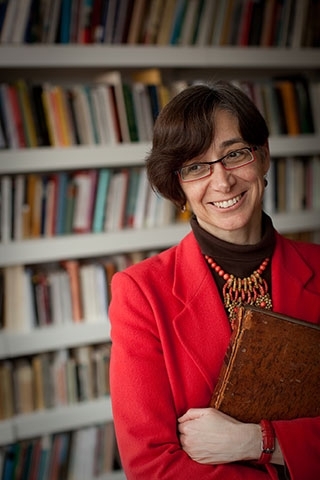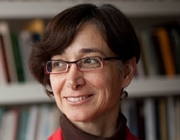 Curriculum Vitae
Curriculum Vitae
At the age of sixteen I won a scholarship to attend Pearson College, a United World College in British Columbia, Canada. Surrounded by 200 students of some 65 nationalities, I became fascinated with how other people view and experience the world. After law school, and while working as a litigator, I obtained an MA in Latin American studies. Combining my practical experience at the courts with my passion for history, for my Ph.D (at the Ecole des Hautes Etudes en Sciences Sociales in Paris) I focused on the administration of criminal justice in Quito (today in Ecuador) in the early modern period. Unlike historians before me, I asked how “justice” operated on a day-to-day level; who was involved in requesting and making it, how they went about doing that, what their decisions were based upon, and what were the constraints that conditioned their experience. This project generated two books: a monograph (La administración como un fenómeno social (1995, French translation 2001, and a revised English version titled Upholding Justice 2005) and a small fragment of my database (Los ministros de la Audiencia de Quito (1995).
Until 1996, when I arrived in the United States as a member of the Institute for Advanced Studies at Princeton, I was a professor of legal history at the Universidad Autónoma of Madrid. In 1997, I became assistant professor of early modern history at the University of Chicago. In Chicago I learned that preparing for classes was as hard, perhaps even harder, than writing a book because it required not only knowing a great deal about a particular subject, not only telling a good story that was both particular and universal, but also dealing with an attentive audience that never ceased asking very hard questions. Also in Chicago, I became fascinated with comparisons. Being part of two very vibrant programs, one focusing on early modern Europe, the other on Latin American history, I was constantly called upon to compare and contrast, on the one hand, and think about the greater narrative, on the other. During this period, playing with scale became my next intellectual project. I wanted to see what would happen to the administration of justice that I described in my dissertation if I were to focus on a single activity and group within it, or, on the contrary, if I looked at it from a bird’s-eye view by observing not the local dynamics but their interaction with the larger imperial context. My second book (Mediación, archivos y ejercicio (1996), in which I concentrated on colonial notaries, did the former; my third book (Ritos de control, prácticas de negociación (2000, French translation 2014), in which I studied the interaction between colonial Latin America and Spain, did the latter. Studying colonial notaries allowed me to think about issues of literacy, as well as the organization, protection, and monopolization of knowledge. The relationship between both sides of the ocean made me part of the growing field of “Atlantic history”.
Next I became intrigued by what it meant to live in an early modern empire. What did people on both sides of the ocean have in common? How did they define their ties to one another? In my fifth book (Defining Nations: Immigrants and Citizens in Early Modern Spain and Spanish America (2004, Spanish translation 2006, French translation 2017) I examined how communities were defined in Europe and overseas. My aim was to present an alternative story for both "state" and "nation" formation. I argued that the questions scholars asked as well as their answers, were highly influenced by a modernist bias that led them to perceive communities either as “natural” or “artificial.” Instead of engaging with these debates, I suggested that early modern categories of belonging (citizenship) were radically different. Because people were classified as citizens or natives, immigrants or locals, in the course of their everyday interactions and by the need to establish their rights and obligations, the communities that resulted were unstable formations, constructed by a plethora of agents that wished to advance their interests, yet as a byproduct also distinguished insiders from outsiders.
After being promoted at the University of Chicago to associate professor (2002) and professor (2003), in 2005 I was appointed professor of history at Stanford. In California I participated in intense and fruitful discussions with a group of scholars working on colonial North America. I also returned to teaching legal history at the Law School. My sixth book Frontiers of Possession: Spain and Portugal in Europe and the Americas, (2015, Spanish and Portuguese translations 2018, Brazilian translation 2019) is the result of both these experiences. In it, I suggest observing the formation of the border between Spain and Portugal in both Europe and the Americas not as an exercise in political, diplomatic, or military history but as a way of understanding how individuals and communities argued their right to land at the same time as they defined who they (and others) were.
Presently at Harvard (since 2013), I am once again involved in new conversations that will surely lead me in interesting new ways. My latest book, A Short History of European Law: the Last Two and a Half Millenia (2018, Spanish and simplified Chinese translations, 2019, French 2022, Italian, Brazilian, and Korean translations forthcoming) is partly a result. In it, I seek to answer the question whether a European law exists, and if so, what was its trajectory. I also seek to answer how European law was exported outside the continent and which were the results. Combining my interest in European and colonial history, and striving to describe a legal history that is attentive to political, social, cultural, and economic developments, I study how successive European legal systems built upon one another from ancient times through the establishment and growth of the European Union. Covering developments on both the Continent and England, the aim is to produce both a manual that summarizes the state of the art, as well as ask questions regarding what we know, make suggestions for future research, and reflect more generally about why and it what way this story is important. Written with both specialists and non-specialists in mind, both historians and jurists (and the public at large), it is also an essay that reflects my over twenty-five years teaching and research experience.
Over the years, my work has been reviewed widely and favorably. In addition to my seven authored books, I published three edited volumes (a forth one is in preparation), and over one hundred and forty articles and book chapters in several languages in the USA, Canada, UK, France, Spain, Germany, Portugal, Italy, The Netherlands, Brazil, Mexico, Colombia, Argentina, Peru, Ecuador, and Israel. My research agenda has constantly shifted geographically (from concentrating on one city to studying various regions of colonial Latin America, Spain, Portugal, Brazil, and Europe as a whole), temporally (from the seventeenth to the eighteenth century, back to the fifteenth and sixteenth and forward to the nineteenth and, most recently, the period from the Roman empire to the present day), and thematically. In have worked in dozens of archives in Europe (Spain, Portugal, Italy, France, and the UK), Latin America (Ecuador, Peru, Bolivia, Venezuela, Argentina, Uruguay, and Brazil), and the USA. Although this interdisciplinary and cosmopolitan background may in itself be viewed as an accomplishment, my greatest achievement to-date is raising nineteen-year old twin boys without compromising too often either intellectual ambition or life as a mother, wife, daughter, and friend.
